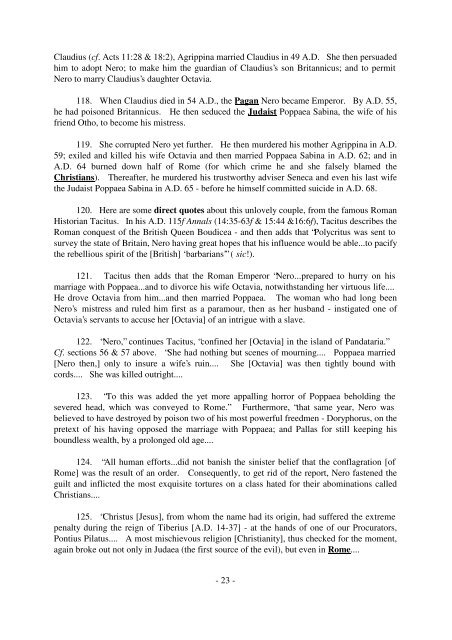JERUSALEM; ROME; REVELATION - The Preterist Archive
JERUSALEM; ROME; REVELATION - The Preterist Archive
JERUSALEM; ROME; REVELATION - The Preterist Archive
Create successful ePaper yourself
Turn your PDF publications into a flip-book with our unique Google optimized e-Paper software.
Claudius (cf. Acts 11:28 & 18:2), Agrippina married Claudius in 49 A.D. She then persuaded<br />
him to adopt Nero; to make him the guardian of Claudius’s son Britannicus; and to permit<br />
Nero to marry Claudius’s daughter Octavia.<br />
118. When Claudius died in 54 A.D., the Pagan Nero became Emperor. By A.D. 55,<br />
he had poisoned Britannicus. He then seduced the Judaist Poppaea Sabina, the wife of his<br />
friend Otho, to become his mistress.<br />
119. She corrupted Nero yet further. He then murdered his mother Agrippina in A.D.<br />
59; exiled and killed his wife Octavia and then married Poppaea Sabina in A.D. 62; and in<br />
A.D. 64 burned down half of Rome (for which crime he and she falsely blamed the<br />
Christians). <strong>The</strong>reafter, he murdered his trustworthy adviser Seneca and even his last wife<br />
the Judaist Poppaea Sabina in A.D. 65 - before he himself committed suicide in A.D. 68.<br />
120. Here are some direct quotes about this unlovely couple, from the famous Roman<br />
Historian Tacitus. In his A.D. 115f Annals (14:35-63f & 15:44 &16:6f), Tacitus describes the<br />
Roman conquest of the British Queen Boudicea - and then adds that “Polycritus was sent to<br />
survey the state of Britain, Nero having great hopes that his influence would be able...to pacify<br />
the rebellious spirit of the [British] ‘barbarians’” ( sic!).<br />
121. Tacitus then adds that the Roman Emperor “Nero...prepared to hurry on his<br />
marriage with Poppaea...and to divorce his wife Octavia, notwithstanding her virtuous life....<br />
He drove Octavia from him...and then married Poppaea. <strong>The</strong> woman who had long been<br />
Nero’s mistress and ruled him first as a paramour, then as her husband - instigated one of<br />
Octavia’s servants to accuse her [Octavia] of an intrigue with a slave.<br />
122. “Nero,” continues Tacitus, “confined her [Octavia] in the island of Pandataria.”<br />
Cf. sections 56 & 57 above. “She had nothing but scenes of mourning.... Poppaea married<br />
[Nero then,] only to insure a wife’s ruin.... She [Octavia] was then tightly bound with<br />
cords.... She was killed outright....<br />
123. “To this was added the yet more appalling horror of Poppaea beholding the<br />
severed head, which was conveyed to Rome.” Furthermore, “that same year, Nero was<br />
believed to have destroyed by poison two of his most powerful freedmen - Doryphorus, on the<br />
pretext of his having opposed the marriage with Poppaea; and Pallas for still keeping his<br />
boundless wealth, by a prolonged old age....<br />
124. “All human efforts...did not banish the sinister belief that the conflagration [of<br />
Rome] was the result of an order. Consequently, to get rid of the report, Nero fastened the<br />
guilt and inflicted the most exquisite tortures on a class hated for their abominations called<br />
Christians....<br />
125. “Christus [Jesus], from whom the name had its origin, had suffered the extreme<br />
penalty during the reign of Tiberius [A.D. 14-37] - at the hands of one of our Procurators,<br />
Pontius Pilatus.... A most mischievous religion [Christianity], thus checked for the moment,<br />
again broke out not only in Judaea (the first source of the evil), but even in Rome....<br />
- 23 -
















